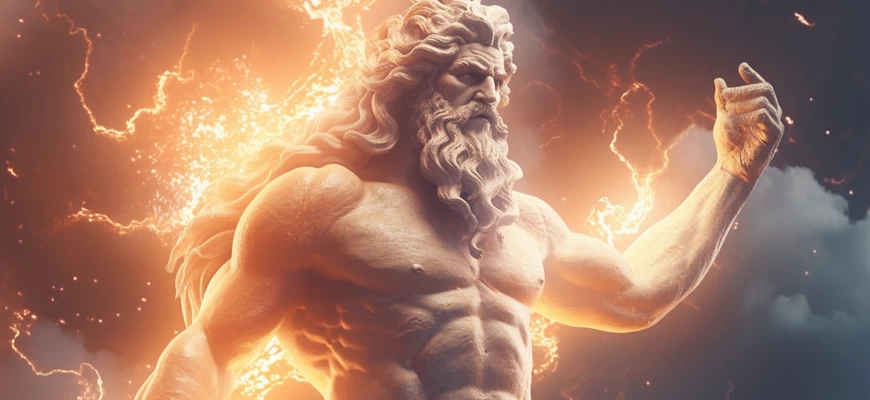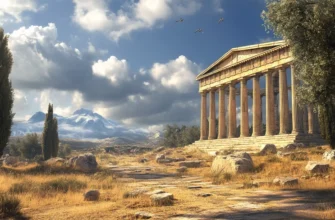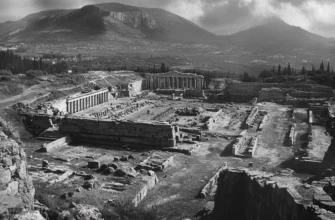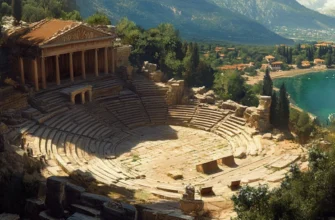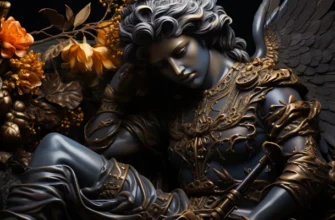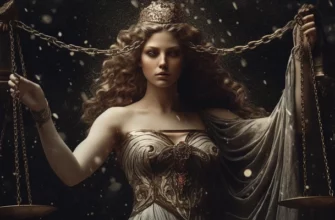Zeus, known as the ruler of Olympus, was one of the most important gods in ancient Greece. He symbolized strength, brilliance, and divine rule. Zeus was descended from the god Cronus and the goddess Rhea. In Greek mythology, he is credited with various stories and adventures, including his victory over Cronus and romantic relationships with goddesses. The cult of Zeus had a great influence on ancient Greek society, and he was recognized as a symbol of power and law.
- Zeus in Greek mythology
- Characteristics and attributes of Zeus
- Zeus and his role in the Olympian pantheon
- Stories and myths about Zeus
- Zeus and the Titans: Victory over Cronus
- The romantic adventures of Zeus: relationships with goddesses
- Zeus and his children: famous descendants
- The cult of Zeus and its reflection in art
- Shrines and temples of Zeus
- Zeus’ influence on ancient Greek society
- Zeus as a symbol of power
Zeus in Greek mythology
Zeus in Greek mythology was considered the ruler of Olympus and the supreme god. He was the son of the Titan Cronus and Rhea. Cronus, one of the Titans, consumed his children because he feared they would deprive him of his power. Rhea, Zeus’ mother, managed to save him by hiding him in a remote place in Crete and drugging Cronus with stones instead of the baby. Later, Zeus stormed Olympus and overthrew Cronus, establishing himself as the ruler of Olympus and the entire divine world.
Zeus symbolized strength, justice, and wisdom. He was known for his brilliant lightning bolts, which he could throw from the sky. Zeus had romantic relationships with numerous goddesses and mortal women, from whom his children were born. His cult had a significant influence on Greek society, and the myths and legends about him became an integral part of Greek culture.
Characteristics and attributes of Zeus
Zeus in Greek mythology is known for his characteristics and attributes. He symbolized strength, wisdom, and justice. Zeus’ attributes included lightning, which served as his instrument of power and might. He was also often depicted with his symbol, an eagle, which represented his power over the sky. Zeus also had a golden belt, which was considered a symbol of his power. He was portrayed as a majestic and powerful god, capable of carrying out his will and imposing justice.
Zeus and his role in the Olympian pantheon
Zeus played an important role in the Olympian pantheon in Greek mythology. He was recognized as the ruler of gods and men. His position as the supreme god gave him power over other gods and goddesses. Zeus was the chief judge and guardian of justice, regulating order in the world, imposing punishments and rewards. He also acted as the patron of hospitality, protection, wisdom, and peaceful coexistence. In the Olympian pantheon, Zeus occupied a central place as the ruler and father of the gods.
Stories and myths about Zeus
The stories and myths about Zeus in Greek mythology are rich and fascinating. One of the most famous stories is about Zeus’s victory over his father Cronus and the Titans, which led to his establishment as ruler of Olympus. Also famous are his romantic adventures with numerous goddesses and mortal women, who bore him many distinguished offspring. Myths also tell of his intervention in human affairs, the establishment of laws, and the imposition of punishments on offenders. Stories about Zeus reveal his strength, wisdom, and power, making him one of the most interesting and influential gods in Greek mythology.
Zeus and the Titans: Victory over Cronus
Mythology tells of Zeus’ victory over his father Cronus and the Titans. According to legend, Cronus devoured his children to preserve his power. But Rhea, Zeus’ mother, hid him on Crete. When Zeus grew up, he returned, defeated Cronus, and freed his brothers and sisters, the Titans. Together, they overthrew Cronus and his followers, and Zeus became the new ruler of Olympus and the pantheon. This victory symbolizes the change of power and the birth of a new order in Greek mythology.
The romantic adventures of Zeus: relationships with goddesses
Zeus’ romantic adventures in Greek mythology were numerous and exciting. He had relationships with numerous goddesses and mortal women. His most famous lovers were Hera, his sister and wife, Aphrodite, the goddess of beauty and love, Metis, the goddess of wisdom, and many others. Zeus used various disguises and tricks to seduce his lovers. These romantic relationships resulted in many famous children, such as Aphrodite, Athena, Hercules, and many others. Zeus’ romantic adventures caused not only love stories but also conflicts and tension in the divine world.
Zeus and his children: famous descendants
Zeus, in his numerous romantic adventures, had many famous descendants. Some of Zeus’s most famous children include Aphrodite, goddess of beauty and love; Athena, goddess of wisdom and strategy; Hercules, legendary hero; Apollo, god of art and music; Artemis, goddess of hunting and wildlife; Dionysus, god of wine and luxury; and Helios, god of the sun. These descendants of Zeus had a great influence on Greek mythology and were objects of worship and reverence in the ancient world.
The cult of Zeus and its reflection in art
The cult of Zeus was of great importance in ancient Greece. He was one of the most important gods and was widely worshipped and revered. Shrines and temples dedicated to Zeus were located throughout Greece, the most famous being those at Olympia and Athens.
In art, Zeus was depicted as a majestic man with a shiny beard and a powerful appearance. He often held a lightning bolt in his hand or sat on a throne, symbolizing his power. Zeus was also depicted with an eagle nearby, emphasizing his power over the sky.
In sculpture, one of the most famous representations of Zeus is the statue of Zeus at Olympia, which was considered one of the Seven Wonders of the World. This magnificent statue was made of gold and ivory and embodied the greatness and power of the god.
The cult of Zeus and his depiction in art helped to maintain and reinforce the role and power of this great god in Greek society.
Shrines and temples of Zeus
In Greek mythology, Zeus had numerous shrines and temples dedicated to him. Some of the most famous were located in Olympia and Athens.
Temple of Zeus at Olympia: This temple, known as the Temple of Olympian Zeus, was one of the greatest temples in Greece. It housed a statue of Zeus, considered one of the Seven Wonders of the World. The temple was the site of major religious and athletic competitions in honor of Zeus.
Temple of Zeus in Athens: This temple, known as the Temple of Olympian Zeus, was located on the Acropolis in Athens. It was built to honor Zeus and the sovereignty of the Athenian state. The temple had a large statue of Zeus made of wood and ivory.
Temple of Zeus at Dodona: Dodona was an ancient center of worship of Zeus and divine providence. The temple at Dodona was famous for its oracle, where sacrifices and rituals were performed to obtain prophecies and advice.
These shrines and temples were important places of worship and religious ceremonies in honor of Zeus. They attracted large numbers of believers and became symbols of the power and greatness of this great god.
Zeus’ influence on ancient Greek society
Zeus, as the chief god of the Greek pantheon, had a significant influence on ancient Greek society. Here are some key aspects of his influence:
Religious center: Zeus was an object of worship and adoration. Shrines and temples dedicated to him were important places for religious rituals and communication with the gods. Religion was central to ancient Greek society, and the cult of Zeus was an integral part of it.
Political symbolism: Zeus was recognized as the ruler of gods and men. His position as the head of the pantheon influenced the political system. The idea of a powerful and wise ruler was reflected in the political institutions and mentality of the Greeks.
Morality and law: Zeus acted as a lawgiver and judge. He established moral norms and punished those who broke them. His presence in myths and legends reminded people of the need to follow rules and moral values.
Cultural influence: Myths and stories about Zeus were an integral part of ancient Greek culture. They were used as a means of transmitting moral and religious values, as well as inspiration for art, literature, and philosophy.
Zeus’ influence on ancient Greek society was broad and multifaceted. He reflected important aspects of the spiritual, political, and social life of the Greeks, and his cult helped maintain social unity and identity. The cult of Zeus united people in a common belief and value system, which contributed to the stability and cohesion of society.
In addition, Zeus was a symbol of strength, wisdom, and justice, and these traits influenced the moral beliefs and behavior of the Greeks. His example demanded honesty, fairness, and moral principles.
In general, Zeus was not only a god but also a symbol of Greek culture, reflected in art, literature, and philosophy. His influence strengthened the values and ideals of Greek society, and his role as ruler of gods and men reflected the deep religious beliefs of the Greeks.
Zeus as a symbol of power
Zeus was a prominent symbol of power in the ancient Greek world. His role as the chief god and ruler of Olympus emphasized his power over the gods and humans. He was the embodiment of supreme authority, power, and control.
Zeus wielded lightning, which symbolized his power and strength. He was a judge and lawgiver, establishing order in the world of the gods and in human society. His decisions were law, and his dominion placed him at the center of attention and respect.
Zeus also enjoyed the privileges of being the father of the gods, which reinforced his status as ruler. He was an object of veneration and worship, and his cult was of great importance in Greek society.
The symbolism of Zeus as ruler and authority had a great influence on the political culture of the Greeks. The idea of a wise and just ruler was reflected in political systems, and his image influenced the creation of the concepts of monarchy and democracy.
All this made Zeus one of the most prominent symbols of power and authority in the ancient Greek world, influencing the consciousness and structure of Greek society.
